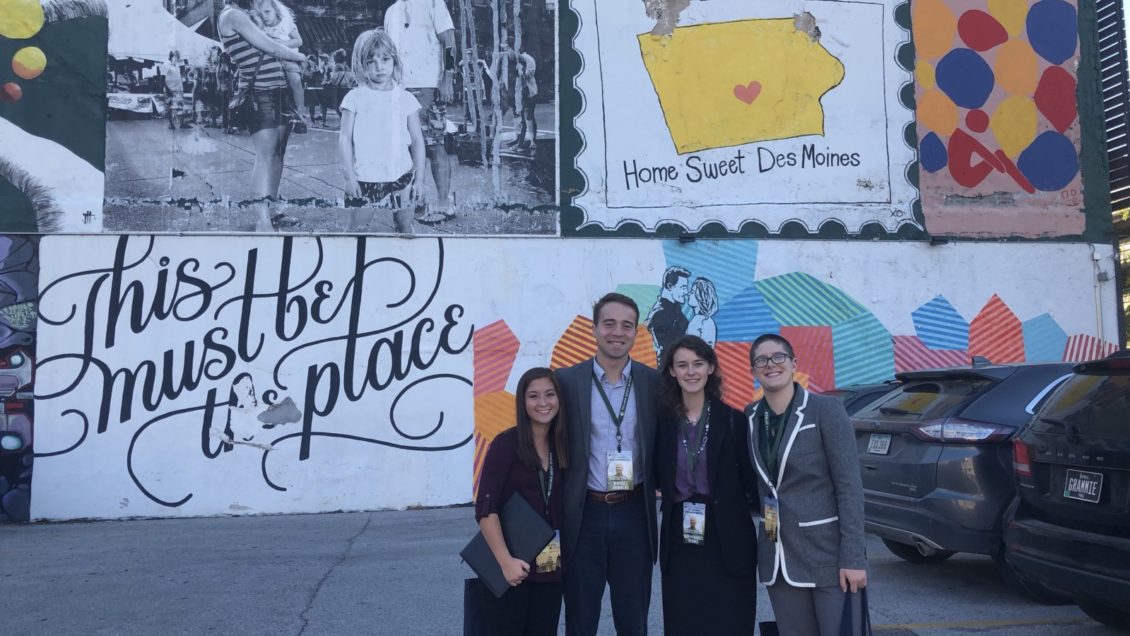Des Moines, Iowa — New technologies in the areas of cellular agriculture, digital agriculture, food processing and safety, gene technology, health and waste reduction all have the potential to transform food systems –– however, they can only do so through cooperation on a global scale. That’s why world leaders and agriculture experts from across the globe recently came together to share knowledge and implement solutions to improve the quality, quantity and availability of food throughout the world.

Last month, four Clemson University students travelled to Des Moines to attend the Borlaug Dialogue, an event put on by the The World Food Prize. The conference convened over 1,200 people from more than 65 countries to build alliances in the pursuit of solutions to world hunger and malnutrition.
A wide array of international leaders, farmers, agribusiness executives, scientists, non-governmental organizations and development experts shared insights throughout the three-day symposium. The theme for this year’s event, “Pax Agricultura: Peace Through Agriculture,” addressed the increasingly intersectional issues of food security, conflict and development. With topics ranging from religion, diplomacy, climate, scientific innovation and corporate leadership, this year’s dialogue served as an opportunity to take stock of the current state of global agriculture and offered a unique platform for national leaders to exchange knowledge to generate greater worldwide food security.
Audrey Jen, sophomore plant and environmental sciences major from Pittsburgh, is one of the students who attended the conference. She became connected with the opportunity through the Clemson University Agronomy Club, an organization for students interested in promoting and participating in sustainable agriculture and local food systems. Throughout the year, the Agronomy Club engages in campus activities, plans special events and volunteers within the local community. Jen is currently the club’s vice president.
Jen was impressed by the level of representation at the conference, as well as by the prestige of its attendees. She felt inspired by the coming-together of an entire world in pursuit of solutions to hunger and malnutrition.

“I was just star struck. I mean, when the President of the Democratic Republic of Congo was speaking in front of me, with all his bodyguards standing behind him…representatives from Cambodia and Mexico and former United States ambassadors, also all there…I felt so honored to be there and was just leaning in, trying to learn as much as I could from them,” Jen said.
During her time in Des Moines, Jen headed a “social media takeover” of the College of Agriculture, Forestry, and Life Sciences (CAFLS) Instagram page, where she kept followers updated on all the most exciting details about the event. Attendees were treated to a lunch made entirely of soy-based products, in order to reinforce the emphasis the conference placed on the importance of soybeans in combating food insecurity. Jen’s soy-based cheesecake made a special appearance in a post.
The conference opened Jen’s eyes to the global impact of agriculture. Hearing from leaders whose countries are dealing with severe food struggles gave her a new perspective into the importance of agricultural research and solutions.
“One of the speakers said it best –– you can’t ever fix other problems until people are fed. Agriculture is such a foundational aspect of any country. You can’t expect to get other things done until people have nutritious, fresh food on their table. That’s why we need to keep doing what we’re doing and exchanging ideas,” Jen said.
Jen urges students to consider pursuing careers in agriculture. The Borlaug Dialogue further reinforced the number of opportunities out there and the significance agriculture can have on some of the world’s biggest challenges.
“It often goes unnoticed by people who don’t know about agriculture, but it’s innovative, there’s new technology and there’s world leaders addressing it. I want students who are choosing a major to know that so many opportunities in agriculture are out there and it’s only going to be a bigger and bigger topic in the future. After all, we need to feed 9 billion people by 2050,” she said.
Get in touch and we will connect you with the author or another expert.
Or email us at news@clemson.edu

